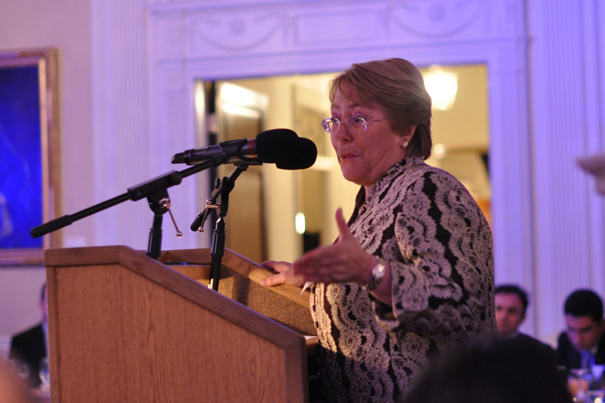
Michelle Bachelet, United Nations undersecretary general for women and former president of Chile, delivered the keynote speech at Harvard’s inaugural Ministerial Health Leaders’ Forum.
Photo by Aubrey La Medica
A meeting of ministerial minds
International health officials air common concerns, trade possible solutions
Over two decades, childhood deaths have fallen significantly, from 12 million annually in 1990 to 7.6 million in 2010, a statistic that simultaneously gives cause for hope and motivation for the global health community to keep its shoulder to the wheel.
“There are still too many preventable deaths,” Harvard School of Public Health (HSPH) Dean Julio Frenk said Monday. “It is within our grasp to make enormous progress to ensure the survival and development of small children.”
Frenk told a gathering of more than a dozen ministers of health from various nations that this is a time of opportunity to make gains in child and maternal health. The reason, he said, is that the 2015 deadline for achieving the United Nations’ Millennium Development Goals is approaching, and many nations are realizing they’re not on track to achieve them, which could prompt renewed activity.
The ministers gathered at the Harvard Kennedy School’s (HKS) Taubman Building for a dinner discussion that ended the first full day of the Harvard Ministerial Health Leaders’ Forum, an event sponsored by the Ministerial Leadership Program for Health, an initiative launched by HSPH and HKS in collaboration with the Children’s Investment Fund Foundation last fall. The forum is designed to allow health ministers to learn from each other’s experiences, draw on the resources of Harvard faculty members, and help the officials to achieve their nations’ health priorities.
The three-day forum mixed in speeches with small-group exercises, case studies, and discussions on setting priorities and learning how to work with finance ministers to get projects funded. On Sunday evening, Michelle Bachelet, United Nations undersecretary general for women and former president of Chile, delivered the keynote speech. Ministerial Leadership in Health Program Executive Director Michael Sinclair said the hope is that the forum will help to create a network of sitting health ministers who can serve as resources for each other, sharing best practices and getting advice from each other as they tackle the difficult health problems facing their countries.
“The program is to recognize the extraordinary leaders from around the world and create an environment to begin building a network of shared learning and mutual support,” said Frenk, who served as Mexico’s minister of health from 2000 to 2006.
On Monday, Frenk addressed the dinner gathering, followed by with Amie Batson of USAID and Mickey Chopra of UNICEF. Batson and Chopra spoke about an upcoming meeting in Washington, D.C., a call to action on improving child health.
“Child survival … is truly something that every country, every stakeholder, every family takes responsibility for,” Batson said.
At the current 2.2 percent annual reduction in the rate of child death, Batson said the world will fall short of the international goals on child health, which call for a two-thirds reduction in childhood death from 1990 levels.
“The question is what the world needs to do differently,” Batson said.
Chopra said that rapid progress is possible if governments move maternal and child health up on their priority lists.
“The gains we can make are just remarkable, if not miraculous,” Chopra said.
The series of eight Millennium global goals include ending poverty and hunger; ensuring universal education, gender equality, child health, maternal health, and environmental sustainability; fighting HIV/AIDS; and creating a global partnership for development.
Some discussion focused on how to best implement health programs. Frenk brought up smallpox as an example of an international success — perhaps the greatest one — though it left little improvement in overall health systems in its wake.
Such a vertically oriented approach focused on a single disease and a horizontal approach focused on strengthening health systems have their drawbacks. Frenk advocated instead a “diagonal” approach, incorporating elements of both, using focused health priorities to drive broad improvements in the health system.
William Hsiao, the K.T. Li Professor of Economics at HSPH, commented near the end of the discussion that we’ve known how to improve maternal and child health, and had the tools to do so, for decades. More recently, we’ve understood the best ways to deliver those tools and apply that knowledge to populations in need, through campaigns to encourage breastfeeding, to vaccinate children, and to improve hygiene. He challenged the ministers in the room, asking them to consider what the barriers are in their own nations to improving maternal and child health.





